

Explore the way-back machine as we look at how JBJS evolved with the web, starting with the first website in 2001, being one of the first journals on the web.
Dr. Chapman approved the OREF-JBJS Journal Club, teamed with HighWire Press for the electronic version of JBJS, and created a CD-ROM version of JBJS. The historic member benefit contract between the AAOS and JBJS was agreed to in 2001.

Dr. Chapman oversaw additional high-level business developments. The Board clarified that JBJS would retain full copyright on all published content, and that it would not grant that copyright to others. Prior to this, exceptions for certain institutions were allowed.
Also, the Trustees agreed that the cover of The Journal of Bone and Joint Surgery would reflect its origins from the American Orthopaedic Association.

JBJS CME products were created with busy orthopaedic surgeons in mind. Meeting CME requirements is a yearly task, and JBJS CME products help surgeons meet those requirements in a timely manner that works best with their schedule—anytime, anywhere.

JBJS offers Monthly, Quarterly, and Subspecialty/Topic-Specific Exams for surgeons to meet their CME and SAE requirements. Exams are released on a steady schedule, and are accessible at home, in the office, or on-the-go. Surgeons earn credits by completing exams based on recent peer-reviewed articles published in The Journal of Bone and Joint Surgery.
Monthly exams contain 33-34 questions and are worth 5 AMA PRA Category 1 Credits™, making them the perfect options for surgeons looking for smaller amounts to complete steadily throughout the year.
Quarterly exams contain 100 questions and are worth 10 AMA PRA Category 1 Credits™. Published every quarter, these time-intensive exams are great for surgeons who like to claim larger amounts of CME less frequently throughout the year.
Subspecialty- and Topic-specific exams—like the Pain Management CME and Clinical Summaries CME assessments—offer surgeons the opportunity to earn their credits while exploring topics tailored to their interests. These exams are worth a range of credits, and allow surgeons to build their knowledge while earning CME in areas in which they are most interested.
The Journal of Bone and Joint Surgery, Inc. is accredited by the Accreditation Council for Continuing Medical Education (ACCME) to provide continuing medical education for physicians.

Dr. Morrey approved Surgical Techniques as a supplement to The Journal of Bone and Joint Surgery.


Dr. Urbaniak determined that JBJS should create a business plan for a commercially viable, online, electronic strategy. The member benefit agreement between the AAOS and JBJS was also revised and extended through 2011.
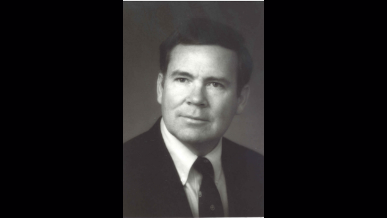

Dr. Hanley approved an expansion of journal titles, with the introduction of JBJS Case Connector, JBJS Essential Surgical Techniques, and JBJS Reviews. With Dr. Mark Miller, a joint venture was approved to develop the JBJS Virtual Recertification Course.

Additionally, Dr. Hanley oversaw the new Enterprise growth strategy led by Kent Anderson, CEO. The Enterprise approach would allow JBJS, Inc. to grow and diversify to meet short-term challenges and long-term stability
Under Dr. Hanley’s leadership of the Enterprise approach, the JBJS name was changed to Striatus Orthopaedic Communications, Inc. The relationships with the AAOS and AOA were redefined, establishing JBJS as a totally independent, non-profit organization. The long-standing business relationship between JBJS and its British counterparts was terminated, resulting in the British journal being renamed The Bone and Joint Journal. Also, JBJS moved its publishing platform from Highwire to Silverchair.

JBJS introduced a number of new journals during this period, including JBJS Case Connector, JBJS Essential Surgical Techniques, JBJS Reviews, and JBJS Open Access. The new journals were designed to increase the JBJS footprint and expand the delivery of high-quality orthopaedic content.
JBJS Case Connector launched in 2012, with Marc Swiontowski as Editor, and was envisioned as a way to improve the clinical usefulness of case reports. Through robust data mining, this valuable resource (now under the leadership of co-Editors Tom Bauer and Ron Lindsey) continues to provide unprecedented levels of connection among cases and assists orthopaedic surgeons in the search for precedents, associations, and trends in their efforts to improve patient care.
JBJS Essential Surgical Techniques also launched in 2012, under the editorial leadership of Ed Cheng and was designed to meet reader demand with step-by-step surgical videos. This video-based journal, featuring step-by-step demonstrations of orthopaedic procedures supported by evidence-based outcomes, offers a rich-media learning tool to residents and surgeons.
JBJS Reviews launched in 2013, with Tom Einhorn as Editor. It was designed to meet reader demand for comprehensive literature reviews, particularly among residents and surgeons seeking recertification. Comprehensive review articles, written by recognized authorities in the field, provide the reader with expert insights into orthopaedic research and clinical experience across 12 subspecialty areas.
JBJS Open Access launched in 2016 under the leadership of co-Editors Robin Richards and Eng Lee as a way to expand the ability of the organization to publish basic-science and clinical findings, as well as new research approaches, that have the potential of impacting musculoskeletal disease and injury care worldwide.
An upgraded website (“the Hub”) launched in 2017, allowing users to search across all JBJS journals, as well as webinars and other educational content, from a single location.
This course contains 15 individual modules designed to prepare the learner for the American Board of Orthopaedics Recertification Examinations. Each module includes a pretest, video presentation, and posttest.
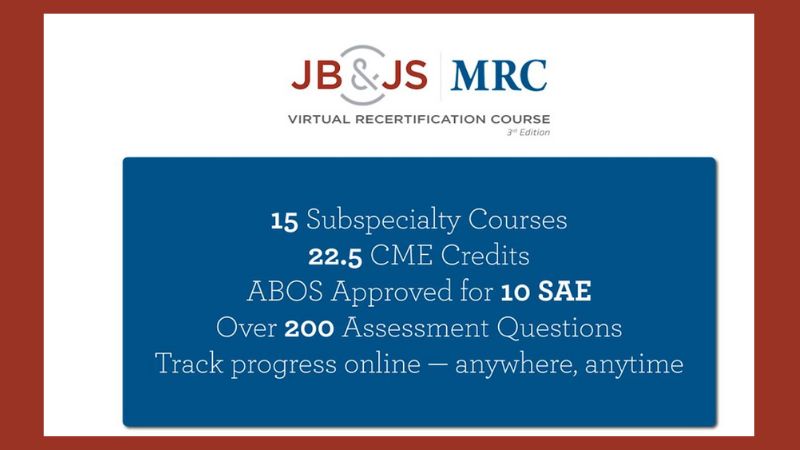

JBJS received accreditation from the Accreditation Council for Continuing Medical Education (ACCME) and introduced the JBJS Recertification Course, which prepares learners for the American Board of Orthopaedics Recertification Examinations. The course has evolved over time. See full product.
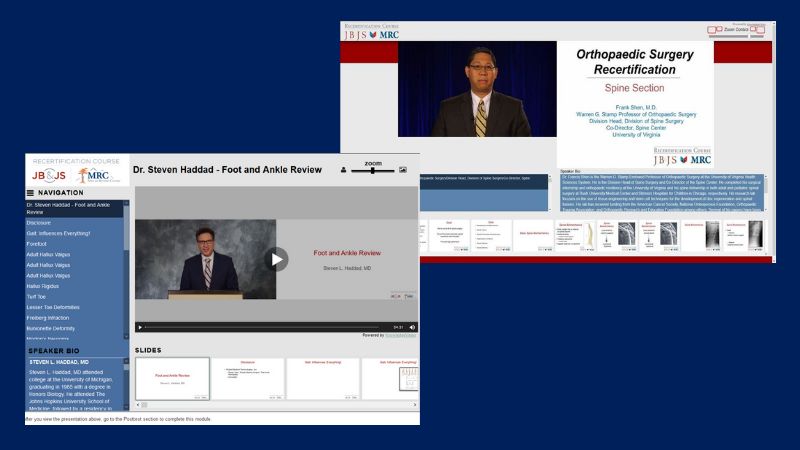

Under Dr. Gelberman’s leadership, JBJS entered its first significant publishing agreement with Wolters Kluwer Health, effective beginning 2016. Dr. Gelberman also authorized the asset acquisition of the Journal of Orthopaedics for Physician Assistants, now JBJS JOPA.

Dr. Gelberman also helped reorganize editorial roles at JBJS. He replaced Kent Anderson as CEO/Publisher and then split the responsibilities of the role. Mady Tissenbaum was promoted to Publisher, and Paul Sandford as CEO of JBJS, Inc., in August 2014.
Additionally, JBJS began the use of SocialCite for citation processing. Editorial assets further evolved as the SocialCite project was terminated in December 2014. JBJS preSCORE assets were also sold, and the organization changed its brand back to JBJS, Inc. from Striatus Orthopaedic Communications, Inc. Moving forward, JBJS would focus on the orthopaedic market prospectively.

JBJS JOPA covers all orthopaedic subspecialties for PAs and NPs and includes two top-notch peer-reviewed journals—JBJS JOPA & JBJS Reviews, plus unlimited journal-based CME.
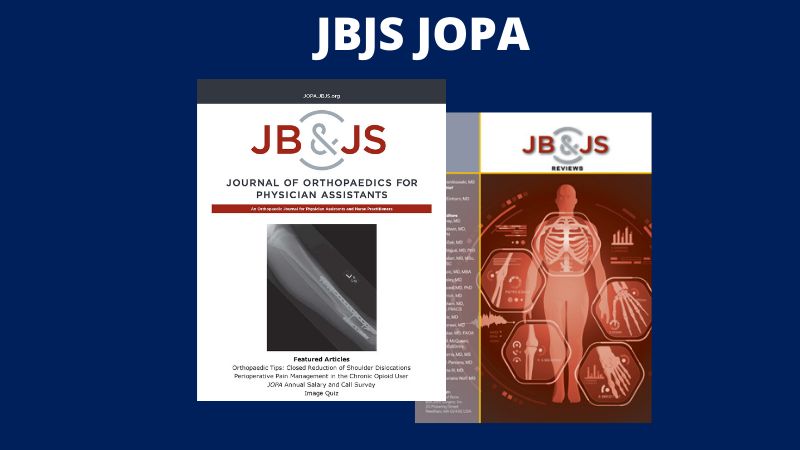

JBJS Complete includes 24 print issues of the flagship and access to JBJS.org. An all-inclusive journal website which provides all that JBJS has to offer: scientific and clinical research, review articles, case reports, surgical technique videos, and peer-reviewed content for orthopaedic PA’s.
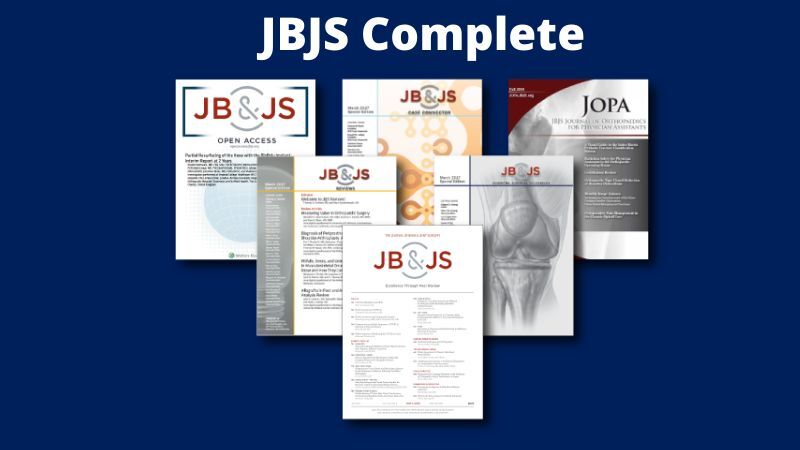

JBJS is excited to introduce the worldwide orthopaedic community to the new JBJS.org website. The website has been the focus for readers to review the current issue, access content not included in print, and perform searches of JBJS content.
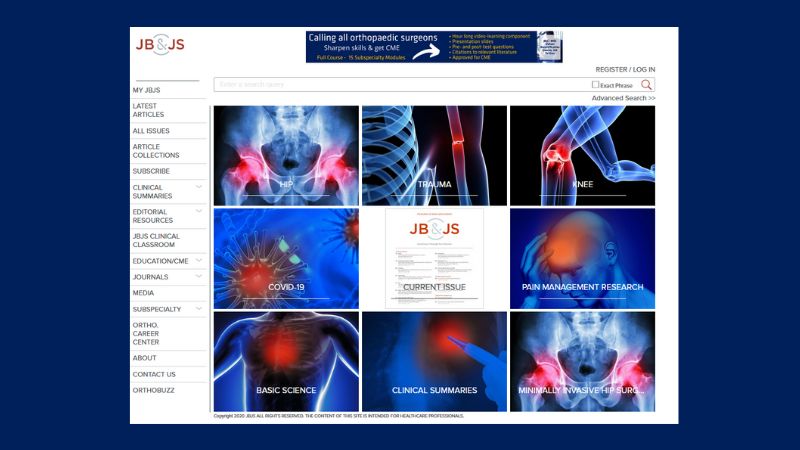

JBJS Clinical Classroom is a leading adaptive learning tool in orthopaedics. It uses a biological model of adaptive learning technology, observes how you learn, and then individualizes content with a precise focus on
knowledge, skill, and confidence deficits.
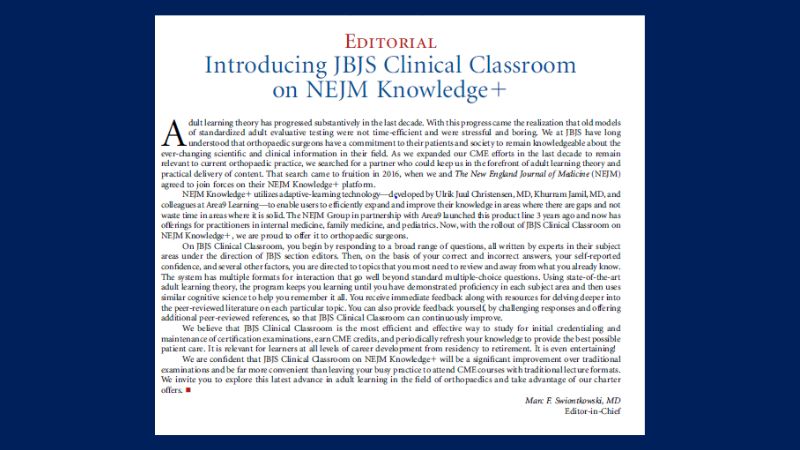

JBJS Clinical Classroom is a leading adaptive learning platform created for orthopaedic surgeons and residency programs. The algorithm creates a unique learning path for users and allows for claiming CME.
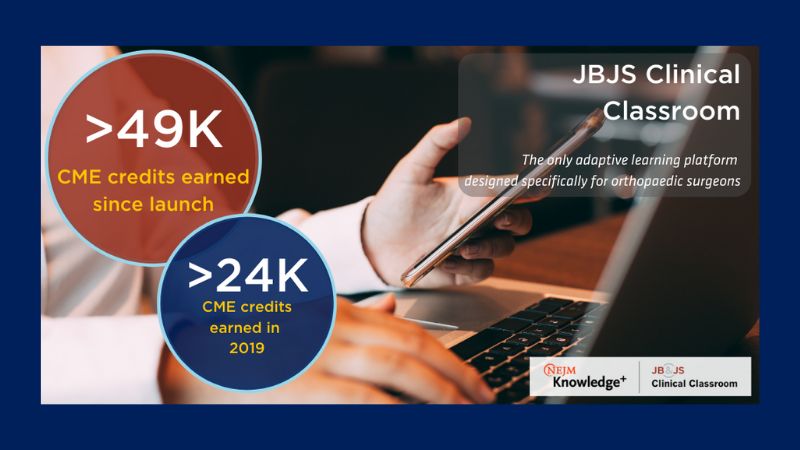
Dr. Weiland helped JBJS expand its education portfolio by acquiring The Miller Review Courses from Dr. Mark Miller and by launching the new AOA Critical Issues in Education Channel in JBJS Open Access.

The AOA Critical Issues in Education Channel was launched as part of an expansion of the agreement between JBJS and the American Orthopaedic Association (AOA). Additionally, The Journal of Bone and Joint Surgery and all other journals became a member benefit of the AOA, which allows for all domestic residents to receive JBJS for free via the CORD group.
During Dr. Weiland’s tenure, the Board of Trustees also terminated JBJS’s frozen pension plan and acquired ownership stake in Orthoevidence™, a global online source for high quality and timely orthopaedic‐only evidence‐based summaries that are pre‐appraised by orthopaedic medical experts.

JBJS Essential Surgical Techniques (EST) and JBJS Open Access (OA) are now archived in PubMed Central (PMC), the national repository of free full-text biomedical literature, and discoverable on PubMed.
JBJS Open Access is an international, peer-reviewed, open-access journal from the publishers of JBJS. The mission of this continuously published online-only journal is to provide a steady flow of comprehensive, objective, and evidence-based basic-science and clinical studies that have the potential to impact orthopaedic care worldwide.
Dr. Swiontkowski provides advice to residents who are considering the field of orthopaedics.
JBJS Reviews is an innovative review journal from the publishers of The Journal of Bone & Joint Surgery. This continuously published online journal provides comprehensive, objective, and authoritative review articles written by recognized experts in the field.
JBJS Case Connector helps improve patient care by providing the medical community with a journal that harnesses technology to provide information tools for discovery and reporting of unusual musculoskeletal problems, findings, treatment, and outcomes.
JBJS Essential Surgical Techniques is the premier journal describing how to perform orthopaedic surgical procedures, verified by evidence based outcomes, vetted by peer review, while utilizing online delivery, imagery and video to optimize the educational experience, thereby enhancing patient care.
JBJS JOPA is a peer-reviewed journal that publishes timely and practical articles covering all orthopaedic subspecialties for physician assistants (PAs) and nurse practitioners (NPs). JOPA provides a unique forum for health-care practitioners to share knowledge and experiences with colleagues in the profession.
The Critical Issues in Education Channel within JBJS Open Access, which is managed in conjunction with the American Orthopaedic Association (AOA), publishes articles covering major issues in the education of orthopaedic medical students, residents, fellows, and faculty.
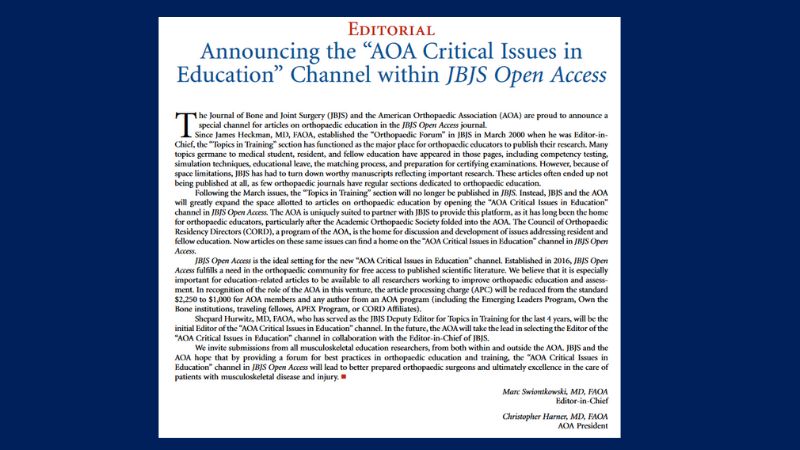

JBJS All-Access CME is designed to help busy orthopaedic surgeons meet their yearly CME requirements. With access to all journal-based CME and SAE exams, as well as JBJS Clinical Classroom, orthopaedic surgeons can meet their goals while building their knowledge.
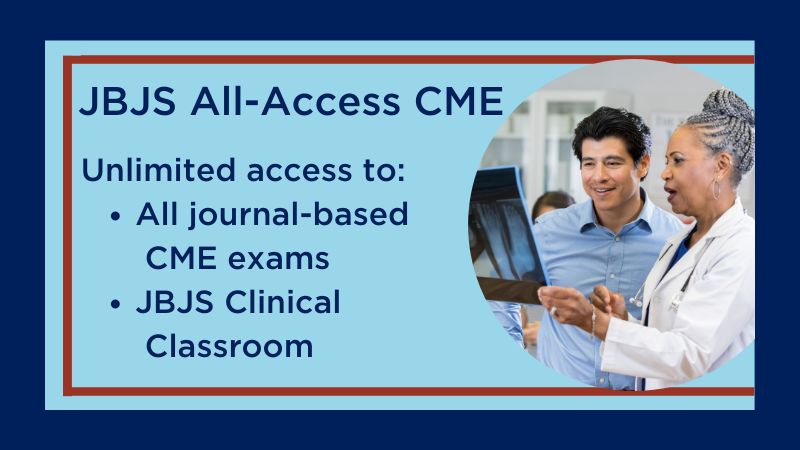

The all-inclusive bundle includes six JBJS journals including 24 print issues of The Journal of Bone and Joint Surgery, unlimited CME activities, as well as annual access to JBJS Clinical Classroom, an adaptive learning tool with more than 4,000 assessment questions across 11 subspecialties.
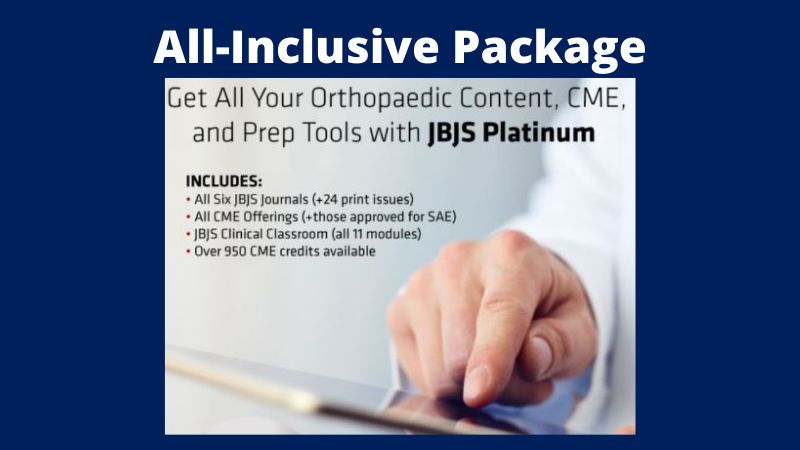

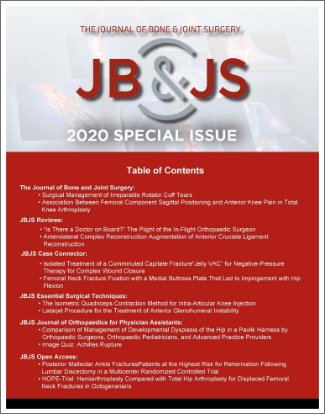
Sign up to receive your free JBJS 2020 Special Issue—a compilation of the most-read articles. You get twelve articles across six JBJS publications in this special issue.